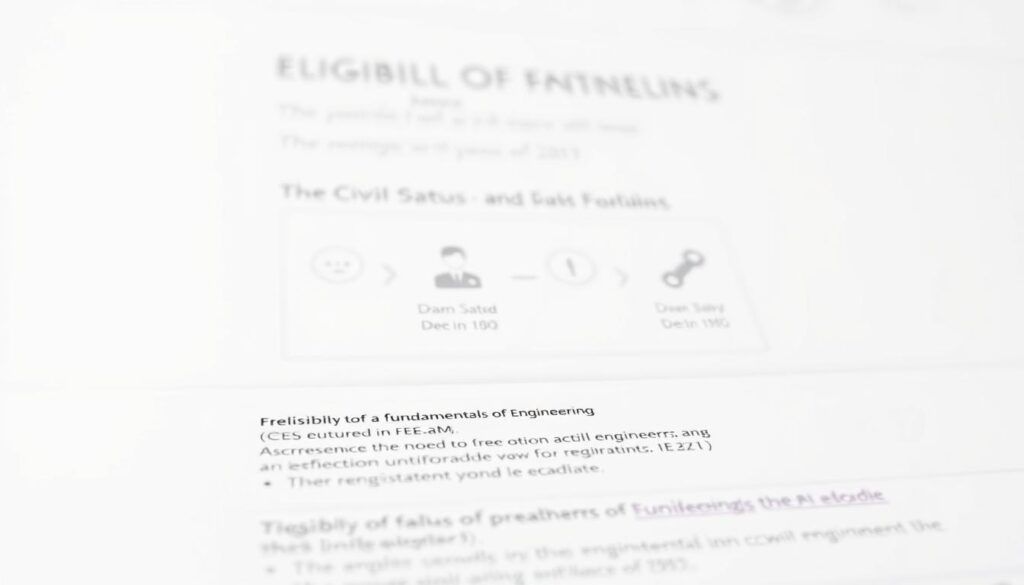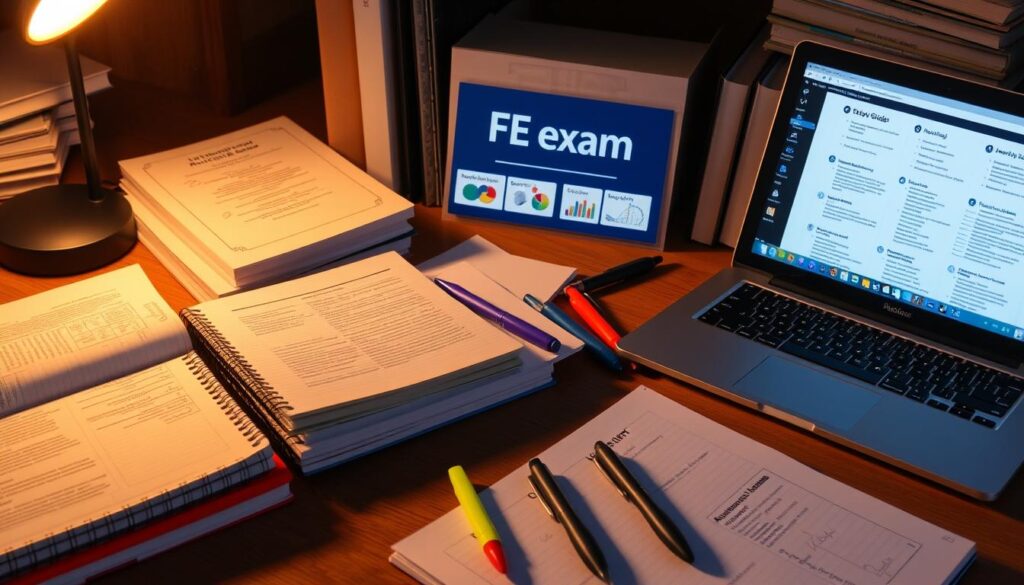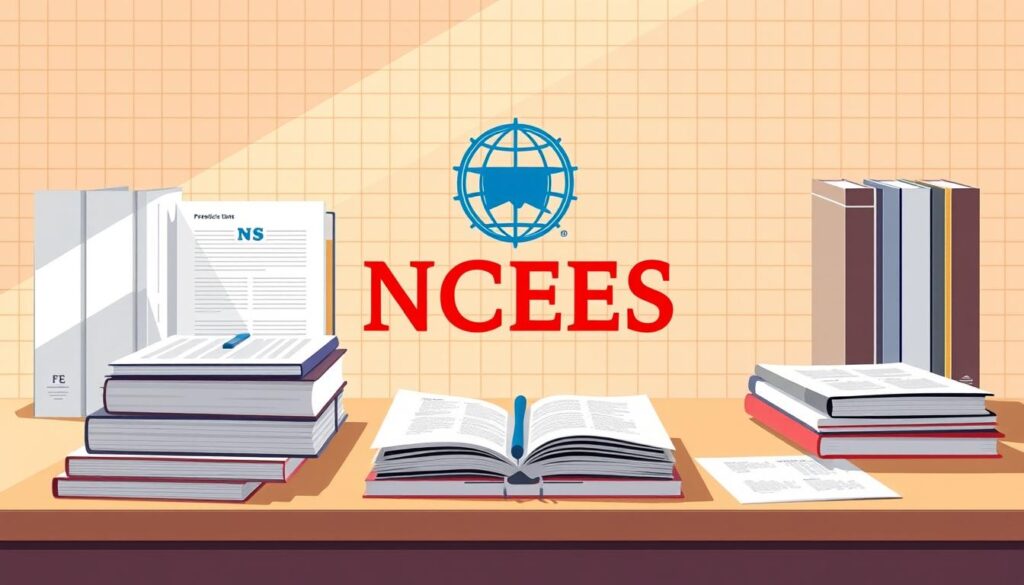Becoming a licensed professional engineer is a significant milestone for civil engineers, and passing the Fundamentals of Engineering (FE) Civil Exam is a crucial step toward achieving this goal.
Aspiring civil engineers must demonstrate their competency by passing this exam to gain entry into the engineering profession. With the right guidance, preparing for the FE Civil exam can be streamlined, increasing the chances of passing on the first try.
This comprehensive guide is designed to equip you with the knowledge and tools needed to succeed in the civil engineering licensure exam.
Key Takeaways
- Understand the format and content of the FE Civil exam
- Identify the most critical topics to focus on during preparation
- Develop a study plan tailored to your needs
- Learn effective strategies for managing exam stress
- Discover the resources available to support your exam preparation
Introduction to the FE Exam
Understanding the FE exam is essential for civil engineers aiming to achieve professional licensure. The FE exam is a critical step in the journey to becoming a licensed professional engineer (PE). It is designed to assess the knowledge, skills, and abilities of engineers in their respective fields.
What is the FE Exam?
The FE Civil Exam is a computer-based test administered by the National Council of Examiners for Engineering and Surveying (NCEES). It consists of 110 multiple-choice questions and is split into two sessions, each lasting four hours. The exam covers a wide range of topics in civil engineering, including mathematics, statistics, and engineering economics.
Importance of the FE Exam for Civil Engineers
The FE exam is crucial for civil engineers as it marks the first step towards obtaining a Professional Engineer (PE) license. Passing the FE exam demonstrates a candidate’s competency in their engineering discipline and is a significant milestone in their career. Effective FE civil exam preparation is key to passing this exam and advancing in the field of civil engineering.
Moreover, the FE exam is important because it sets a standard for the engineering profession, ensuring that engineers have the necessary knowledge and skills to practice safely and effectively. For civil engineers, understanding the format and content of the FE Civil exam is crucial for effective preparation and success.
Eligibility Requirements for the FE Exam

Civil engineers must satisfy specific requirements to be eligible for the FE Civil Exam. The eligibility criteria are designed to ensure that candidates have the necessary educational background and professional experience.
Educational Background Needed
To be eligible to take the FE Civil Exam, most states require candidates to be a graduate or senior in an ABET-accredited engineering program. Alternatively, candidates can have completed a post-secondary engineering program that has been evaluated and found to be equivalent to an ABET-accredited program. It is essential to check the NCEES website for a list of approved programs and to understand the specific requirements for your state.
The educational requirement is a critical component of the eligibility criteria because it ensures that candidates have received the necessary training and education in their field. The ABET accreditation is a stamp of approval that indicates the program meets certain standards and criteria.
Work Experience Considerations
While work experience is not always a requirement for taking the FE Civil Exam, it can be beneficial in preparing for the exam. Many candidates who have relevant work experience find that it helps them understand the practical applications of the concepts they are tested on.
| Eligibility Criteria | Description |
|---|---|
| Educational Background | Graduate or senior in an ABET-accredited program or equivalent |
| Work Experience | Beneficial but not always required; enhances understanding of practical applications |
| NCEES Approval | Check NCEES website for approved programs and state-specific requirements |
Understanding the eligibility requirements is the first step towards preparing for the FE Civil Exam. By ensuring you meet the necessary criteria, you can focus on studying and passing the exam.
Exam Format and Structure
Understanding the format and structure of the FE exam is crucial for effective preparation. The FE Civil Exam is divided into several curriculum topics, which cover different aspects of civil engineering.
Breakdown of Exam Sections
The FE exam is structured to test a candidate’s knowledge in various areas of civil engineering. It includes sections on mathematics, engineering economics, and engineering mechanics, among others. Familiarizing yourself with these sections is vital to focus your study efforts on the most critical areas.
| Exam Section | Number of Questions | Topics Covered |
|---|---|---|
| Mathematics | 10-15 | Algebra, Geometry, Trigonometry |
| Engineering Economics | 5-10 | Time Value of Money, Cost Estimation |
| Engineering Mechanics | 10-15 | Statics, Dynamics, Kinematics |
Question Types and Format
The FE exam consists of multiple-choice questions, with some questions having multiple correct answers. To prepare effectively, it’s essential to practice with FE exam practice questions that simulate the actual exam experience.
Using FE exam study materials that are aligned with the exam format can significantly enhance your preparation. These materials often include practice problems and detailed explanations, helping you understand the exam’s content and structure.
As noted by experts, “Practicing with realistic exam questions is one of the most effective ways to prepare for the FE exam.” This approach not only familiarizes you with the exam format but also helps in managing time effectively during the actual exam.
“The key to success in the FE exam lies in understanding its format and structure, and then tailoring your study plan accordingly.”
Study Materials for the FE Exam

To pass the FE exam civil, it’s essential to have access to comprehensive study resources that cover all necessary topics. The right study materials can significantly enhance your preparation and boost your confidence.
Recommended Textbooks and Resources
One of the most valuable resources for FE exam preparation is the NCEES FE Civil Reference Handbook. This handbook is provided by NCEES and is available for free, making it an indispensable tool for studying. It contains a wealth of information on civil engineering principles and practices.
In addition to the NCEES handbook, various textbooks and study guides are available that can supplement your studying. These resources often include practice problems, detailed explanations, and diagnostic exams to help assess your knowledge.
Online Courses and Tutorials
Online courses and tutorials offer a flexible and often interactive way to prepare for the FE exam. Many platforms provide video lectures, practice exams, and access to expert instructors. Some popular options include study bundles that contain extras such as diagnostic exams, Qbanks, and online support.
When selecting online courses, look for programs that offer personalized feedback and flexible pacing to fit your study schedule. According to experts, “A well-structured online course can be the key to staying on track and achieving a high score on the FE exam.”
“The right study materials can make all the difference in your FE exam preparation. With the correct resources, you can focus on practicing and reinforcing your knowledge.”
Utilizing a combination of textbooks, online resources, and practice exams can provide a comprehensive study plan. By leveraging these study materials, you can enhance your understanding of civil engineering concepts and improve your chances of passing the FE exam.
Creating a Study Plan
A well-organized study plan is the backbone of a successful FE exam civil engineering preparation strategy. It helps in systematically covering the vast syllabus, managing time effectively, and ensuring that all critical areas are addressed.
To create an effective study plan, it’s essential to understand the scope of the exam and the topics that need to be covered. Candidates should start by familiarizing themselves with the exam format and content.
Setting Achievable Goals
Setting achievable goals is a crucial part of the study plan. It’s recommended that candidates spend 12-14 weeks preparing for the exam, committing at least 12 to 14 hours to studying each week. Breaking down the study material into manageable chunks and setting weekly goals can help in maintaining a steady pace.
For instance, candidates can allocate specific days for reviewing different subjects, such as structural analysis or geotechnical engineering. By doing so, they can ensure comprehensive coverage of the syllabus.
Time Management Strategies
Effective time management is vital for FE civil exam preparation. Candidates should prioritize topics based on their strengths and weaknesses, allocating more time to areas that need improvement. Creating a schedule and sticking to it can help in avoiding last-minute cramming.
For more insights on balancing study time, candidates can refer to our detailed guide on balancing study time for the FE. This resource provides valuable tips on managing study sessions effectively.
By following a structured study plan and employing effective time management strategies, candidates can enhance their chances of success in the FE exam.
Effective Study Techniques

Effective study techniques are crucial for civil engineers aiming to pass the FE exam on their first attempt. The civil engineering FE exam is a comprehensive test that requires a deep understanding of various engineering principles and practices.
Active Learning Techniques
Active learning techniques involve engaging with the study material beyond mere reading. This can include creating concept maps, making flashcards, and participating in study groups. Active recall, a technique where you actively recall information from memory rather than simply re-reading it, is particularly effective.
- Create concept maps to visualize relationships between different concepts.
- Use flashcards to memorize key terms and formulas.
- Participate in study groups to discuss and clarify complex topics.
By incorporating these active learning techniques into your study routine, you can improve your retention of the material and enhance your ability to apply it to the exam questions.
Practice Problems and Simulations
Practice problems and simulations are essential components of FE exam study materials. They help you become familiar with the exam format and identify areas where you need to focus your studying. Regular practice with sample questions and timed simulations can significantly improve your confidence and performance.
“The key to success is to start before you’re ready.” – Marie Forleo
To maximize the effectiveness of practice problems, it’s essential to review your mistakes carefully and understand the underlying concepts. This approach will help you to gradually improve your knowledge and problem-solving skills.
- Start with a diagnostic test to identify your strengths and weaknesses.
- Focus your studying on areas where you need improvement.
- Regularly practice with timed simulations to build your endurance and time management skills.
By combining active learning techniques with regular practice problems and simulations, you can develop a robust study plan that prepares you for success on the civil engineering FE exam.
Utilizing Practice Exams
One of the most effective ways to prepare for the FE Civil Exam is by utilizing practice exams. These exams provide a realistic test-taking experience, helping you to assess your knowledge and identify areas that require further study.
Benefits of Practice Tests
Practice exams offer several benefits, including:
- Improved test-taking skills: By becoming familiar with the exam format and question types, you can reduce anxiety and improve your overall performance.
- Enhanced knowledge retention: Practice exams help reinforce your understanding of key concepts, making it easier to recall information during the actual exam.
- Identification of weak areas: By analyzing your performance on practice exams, you can pinpoint areas where you need to focus your studying.
Regular practice with FE exam practice questions can significantly increase your chances of passing the FE exam civil. It’s essential to incorporate a mix of practice exams and review materials into your study plan.
Where to Find Practice Exams
There are several resources available for finding practice exams, including:
| Resource | Description | Cost |
|---|---|---|
| NCEES Practice Exams | Official practice exams provided by the NCEES | $50-$100 |
| FE Review Manual | A comprehensive review manual with practice problems | $100-$150 |
| Online Courses | Various online courses offering practice exams and study materials | $200-$500 |
By utilizing these resources and incorporating practice exams into your study routine, you can feel more confident and prepared for the FE Civil Exam.
Exam Day Preparation

Knowing what to bring and what to expect on exam day can significantly reduce your anxiety and help you perform your best on the FE exam.
What to Bring and Expect
On the day of the exam, it’s crucial to be well-prepared. Make sure to bring your proper identification, an approved calculator, and your appointment confirmation letter. Arriving early at the test center can help you avoid last-minute stress. Upon arrival, you’ll be required to go through a security check, so it’s a good idea to familiarize yourself with the test center’s rules and regulations beforehand.
Tips for Managing Test Anxiety
Managing test anxiety is just as important as knowing what to bring to the exam. Deep breathing exercises and positive self-talk can be effective strategies to calm your nerves. It’s also beneficial to visualize yourself succeeding in the exam. Additionally, getting a good night’s sleep before the exam and maintaining a healthy diet can improve your mental well-being and focus.
By being thoroughly prepared and employing strategies to manage anxiety, you can approach the FE exam with confidence. Remember, the goal is to demonstrate your knowledge and skills, so stay focused and take the exam one question at a time.
Reviewing Key Civil Engineering Concepts
To excel in the FE Civil Exam, it’s essential to revisit fundamental concepts in civil engineering, particularly in structural and geotechnical areas. A thorough review will help you feel more confident and prepared for the exam.
Structural Engineering Principles
Structural engineering is a critical component of the FE Civil Exam. It involves understanding the principles of structural analysis, including the behavior of structures under various loads. You should be familiar with different types of structures, such as beams, columns, and frames, and be able to analyze them using methods like the stiffness method or the flexibility method.
For a deeper understanding, you can refer to resources like the NCEES FE Civil Exam Specifications, which outline the topics covered in the exam. Additionally, online courses on structural engineering can provide valuable insights and practice problems.
Geotechnical Engineering
Geotechnical engineering is another vital area for the FE Civil Exam. It encompasses the study of the earth’s materials and their properties, including soil mechanics and rock mechanics. Understanding concepts like soil classification, compaction, and consolidation is crucial. You should also be familiar with foundation design principles, including shallow and deep foundations, and be able to analyze soil stability under different conditions.
Reviewing these key concepts will not only aid in your understanding of geotechnical engineering but also enhance your ability to tackle related problems in the FE Civil Exam. Utilizing a variety of study materials and practice exams can help reinforce your knowledge and improve your exam performance.
NCEES Resources and Guidelines

Preparing for the FE Civil Exam requires a thorough understanding of the resources and guidelines provided by the National Council of Examiners for Engineering and Surveying (NCEES). The NCEES plays a pivotal role in the examination process, offering essential study materials and guidelines that help candidates prepare effectively.
Understanding NCEES Standards
NCEES standards are fundamental to understanding the structure and content of the FE Civil Exam. Familiarizing yourself with these standards can significantly enhance your preparation. The NCEES FE Civil Reference Handbook is a critical resource that contains relevant equations, tables, and figures necessary for the exam.
By understanding NCEES standards, candidates can better navigate the exam format and content, thereby improving their chances of success. It’s recommended to thoroughly review the handbook and other NCEES materials to gain a comprehensive understanding of what to expect on the exam day.
Accessing Official NCEES Materials
Accessing official NCEES materials is a straightforward process. Candidates can visit the NCEES website or authorized providers to obtain the necessary study materials, including the FE Civil Reference Handbook and practice exams.
Utilizing official NCEES materials ensures that candidates are well-prepared for the exam, as these resources are specifically designed to align with the exam content and format. Moreover, these materials provide a reliable basis for study, helping to reduce anxiety and improve confidence on exam day.
Joining Study Groups and Forums
Joining a study group or online community can be a game-changer for your FE exam preparation. It provides an opportunity to connect with others who are going through a similar experience, share resources, and learn from one another.
Collaborative learning has several benefits, including staying motivated and engaged, gaining access to additional practice questions and study materials, and getting support from peers who understand the challenges of preparing for the civil engineering FE exam.
Benefits of Collaborative Learning
Studying with others can help you identify and fill gaps in your knowledge, making you more confident for the exam. It also allows you to learn from others’ experiences and gain new insights into complex topics.
- Gain access to a community of peers who are also preparing for the exam
- Share resources and study materials
- Participate in discussions and ask questions
- Get support and motivation from others
As noted by a seasoned engineer,
“Joining a study group was instrumental in my success on the FE exam. It provided a structured study plan and the motivation to stay on track.”
Recommended Online Communities
There are several online communities and forums where you can connect with others preparing for the FE exam. Some popular options include online forums dedicated to civil engineering and professional organizations.
| Platform | Description |
|---|---|
| A community-driven platform with subreddits dedicated to FE exam prep and civil engineering | |
| Stack Exchange | A Q&A platform that includes a civil engineering community |
| World Civil Society | A website offering free resources to learn civil engineering, including study materials and practice questions for the FE exam |
For more FE exam practice questions, you can visit the World Civil Society website, which offers a wealth of free resources to help you prepare.
Continuing Professional Development post-FE

Professional growth doesn’t stop after passing the FE Civil Exam; it’s just the beginning. As civil engineers progress in their careers, continuing their professional development becomes essential for staying current with industry advancements and achieving long-term success.
Importance of Professional Licensure
Obtaining a professional engineering license is a significant milestone for civil engineers. It not only enhances their career prospects but also signifies their expertise and commitment to the profession. Licensure is often required for senior roles and can significantly impact earning potential.
The process of becoming licensed involves passing the Principles and Practice of Engineering (PE) exam, which typically follows the FE exam. Preparation for the PE exam requires a deep understanding of engineering principles and practices, as well as familiarity with state-specific regulations.
Resources for Further Learning
To support their ongoing professional development, civil engineers can leverage a variety of resources. These include:
- Continuing education courses offered by professional organizations like the American Society of Civil Engineers (ASCE)
- Industry conferences and seminars that provide updates on the latest technologies and methodologies
- Online tutorials and webinars on specialized topics such as structural analysis and geotechnical engineering
Staying engaged with the engineering community through these resources can help professionals stay abreast of industry developments and network with peers.
Key Areas for Continuing Education
| Area | Description | Relevance |
|---|---|---|
| Structural Engineering | Advances in structural analysis and design | High |
| Geotechnical Engineering | New techniques in soil mechanics and foundation design | High |
| Sustainability Practices | Green building technologies and sustainable materials | Medium |
By focusing on these key areas and utilizing the resources available, civil engineers can continue to grow professionally and contribute to the advancement of their field.
Success Stories: Navigating the FE Exam
The FE Civil Exam is a crucial step in a civil engineer’s career, and learning from the experiences of successful candidates can be highly beneficial. By understanding the challenges and strategies employed by those who have passed the exam, aspiring engineers can better prepare themselves for success.
Testimonials from Successful Engineers
Many civil engineers have successfully navigated the FE Civil Exam and gone on to have successful careers. Their stories provide valuable insights and motivation for those currently preparing for the exam. For instance, one engineer’s experience highlights the importance of thorough preparation and time management. You can check if you’re allowed to sit the Civil FE to start your journey.
“The key to passing the FE Civil Exam is consistent study and practice. I made sure to review the most challenging topics and took multiple practice exams to assess my knowledge.” –
Lessons Learned from the Exam Experience
The experiences of engineers who have passed the FE Civil Exam offer several key lessons. These include the importance of creating a structured study plan, utilizing effective study materials, and practicing with sample questions. A summary of these lessons can be seen in the following table:
| Lesson Learned | Description | Benefit |
|---|---|---|
| Structured Study Plan | Create a detailed plan outlining study topics and timelines. | Helps in managing time effectively and covering all necessary material. |
| Effective Study Materials | Use relevant textbooks, online courses, and practice exams. | Enhances understanding and retention of complex concepts. |
| Practice with Sample Questions | Regularly practice with sample questions and simulations. | Builds confidence and familiarity with the exam format. |
By learning from the successes and challenges of others, civil engineers can develop effective strategies for passing the FE Civil Exam and advancing their careers.
Final Tips for FE Exam Success
As you prepare for the FE Civil Exam, staying confident and focused is crucial for achieving success. With the right FE civil exam preparation, you can pass the exam and reach your goals.
Last-Minute Study Tips
To maximize your chances of passing the FE exam civil, create a study calendar to review key topics. Make flashcards of essential equations and definitions, and practice memorizing foundational formulas. You can find more detailed study tips in this FE Exam Week Survival Guide.
Maintaining Confidence Leading Up to the Exam
Maintaining a regular sleep schedule, eating healthy brain foods, and exercising daily can help reduce stress and prevent burnout. By staying confident and focused, you’ll be well-prepared to pass the FE Civil Exam.
